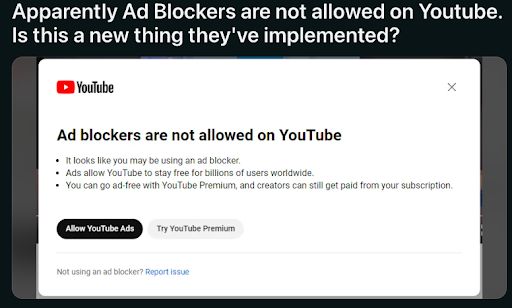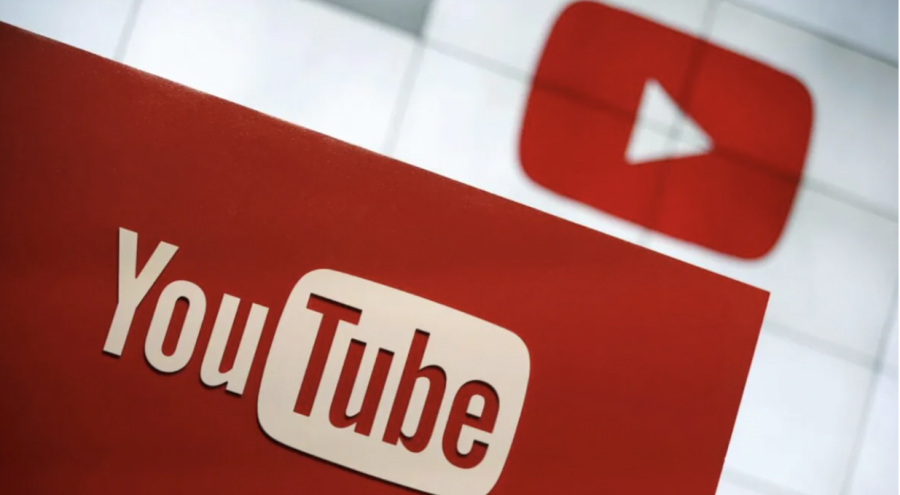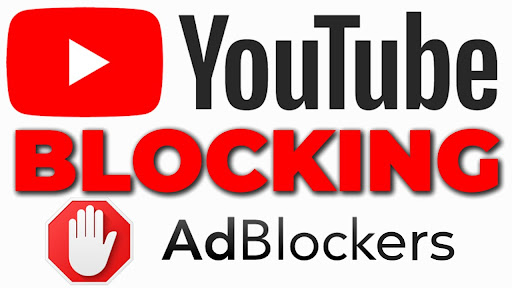YouTube, the world’s leading video platform is currently testing a new policy that requires users to disable their ad blockers or subscribe to YouTube Premium to watch videos without interruptions. The move has sparked outrage among users, who say it would be an infringement on their privacy and freedom of choice.
The experiment came to light when a user on Reddit posted:
“Apparently Ad Blockers are not allowed on Youtube.”

The Reddit user had noticed a popup message from YouTube stating, “Ad blockers are not allowed on YouTube.” The message emphasized that ads support creators on the platform and encouraged users to enroll in YouTube Premium, a monthly subscription service, to ensure creators could continue to be compensated.
This test appears to be in its early stages and is limited to a small number of users. It remains unclear if the video-sharing platform intends to expand this experiment to a wider audience. However, YouTube has a history of conducting experiments that are later abandoned, such as the ill-received attempt to force viewers to watch ten unskippable ads consecutively.
YouTube Urges Users to Allow Ads or Try YouTube Premium
A YouTube spokesperson confirmed the ongoing experiment, stating:
“We’re running a small experiment globally that urges viewers with ad blockers enabled to allow ads on YouTube or try YouTube Premium.”
The spokesperson also highlighted that ad blocker detection is not a new concept, and many other publishers regularly ask viewers to disable ad blockers.
YouTube’s motivation behind potentially blocking ad blockers may be tied to its growing YouTube Premium and Music services, which surpassed 80 million subscribers in November 2022, according to a Variety report.
Statista named Youtube as the second most popular social network worldwide as of January 2023, sitting at over 2.5 billion monthly active users.
Encouraging users to subscribe to YouTube Premium would likely contribute to maintaining this accelerated membership growth rate.
User Concerns and Potential Alternatives
The possibility of YouTube blocking or banning ad blockers follows recent efforts to address third-party tools interfering with its revenue streams. Earlier changes in YouTube’s backend sought to counteract apps like YouTube Vanced, which offered free access to YouTube Premium features.
Concerns have been raised among users about the potential consequences of ad blockers being disallowed on YouTube.
The implementation of such a measure could impact the user experience on YouTube, as users have reported excessive numbers of ads interrupting their videos. Complaints include instances of two minutes of unskippable ads, multiple ads before and during videos, and ads that disrupt the content itself.
Users are concerned that if ad blockers are no longer allowed, they may resort to finding alternative platforms for their entertainment needs.
One user on posted on Twitter saying that he might be forced to go to other alternatives such as “Odysee or Rumble” if YouTube forces them to watch ads.
Might switch to Odysee or Rumble if they start forcing me to watch ads. YouTube is garbage without an ad blocker and some extensions. https://t.co/xRCp3VMnyd
— mapo (@ytp_news) May 10, 2023
A user on Reddit wrote:
“I have no idea what else I’d move to, but I’m willing to find entertainment elsewhere other than youtube if I must.”
If YouTube does block ad blockers, it would be a major setback for users who rely on them to block unwanted ads. Adblockers can be used to block all ads on YouTube, or they can be configured to block only certain types of ads, such as those that are intrusive or malicious.
There are several alternatives to YouTube that do not use ads. Some of the most popular alternatives include Vimeo, Dailymotion, and Twitch. These platforms offer a variety of features that are similar to YouTube, including the ability to watch videos, upload videos, and comment on videos.
Vimeo is a video-sharing platform that was founded in 2004. It is known for its high-quality videos and its focus on user privacy. Vimeo does not use ads, and it offers a variety of features that are similar to YouTube, as listed above.
Dailymotion is a French video-sharing platform that was founded in 2005. It is one of the most popular video-sharing platforms in Europe, and it has a large user base in the United States. Dailymotion does not use ads, and it offers a variety of features that are similar to YouTube.
Twitch is a live-streaming platform that was founded in 2011. It is known for its focus on gaming and esports. Twitch does not use ads, and it offers a variety of features that are similar to YouTube, including the ability to watch live streams, upload videos, and engage in the comments section.
If YouTube does block ad blockers, many users will likely switch to one of these alternative platforms. The move could also lead to a decline in YouTube’s ad revenue, as users who are unable to block ads will be less likely to watch videos.
(Source: Youtube)
Uncertain Future and User Impact
At present, it remains uncertain when or if YouTube will implement a policy to completely block ad blockers. While users can currently bypass any potential restrictions, the fact that YouTube is reportedly considering such measures raises concerns among its user base.
YouTube’s priority is to strike a balance between maintaining a revenue stream for creators and providing an enjoyable viewing experience for its users. The outcome of this experiment will undoubtedly influence the future direction of YouTube’s ad policies and the choices available to its vast user community.
Related news:
- Vudu Lands Major Deal With AMC to Add All 200,000 AMC Movies and Shows to Its Platform
- Google Was Behind the $100M Investment in the Video AI Startup Runway
- Where to Buy Stocks Online
What's the Best Crypto to Buy Now?
- B2C Listed the Top Rated Cryptocurrencies for 2023
- Get Early Access to Presales & Private Sales
- KYC Verified & Audited, Public Teams
- Most Voted for Tokens on CoinSniper
- Upcoming Listings on Exchanges, NFT Drops


